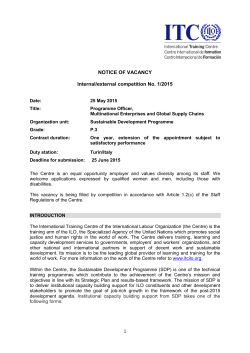
flyer
The ILO Turin Centre’s facilities Located in an attractive park on the banks of the River Po, the Centre’s campus provides a congenial environment in which to live and study. • It contains 21 pavilions with fully equipped modern classrooms, conference halls and meeting rooms fitted out for multilingual simultaneous interpretation, and a computerized documentation centre linked to various data banks. The campus has 287 study/bedrooms, all with private bathroom, telephone, free access to internet and cable television. It also has: • a reception desk open 24 hours a day; • a restaurant, a self-service canteen and a coffee lounge, all catering for international dietary needs; • a bank; • a travel agency; • a laundry service; • a post office; • an internet point; • a recreation room; • facilities for outdoor and indoor sports; • medical service. Social events are regularly held both on and off campus, so that participants from different cultural backgrounds can make the most of a stimulating international environment. A908096 Evolving forms of employment relationships and decent work 11 – 15 May 2015 Turin (Italy) For further information, please contact: International Training Centre of the ILO Programme on International Labour Standards, Rights at Work and Gender Equality Viale Maestri del Lavoro 10 10127 Turin (Italy) Phone: +39.011.693.6305 / +39.011.693.6600 Fax: +39.011.639.1913 E-mail: ilsgen@itcilo.org Website: www.itcilo.org Copyright © International Training Centre of the International Labour Organization, 2015. All rights reserved. Design Luca Fiore – Printed by the International Training Centre of the ILO, Turin, Italy Made of paper awarded the European Union Eco-label, reg.nr FR/011/002, supplied by International Paper. www.itcilo.org A908096 Evolving forms of employment relationship ps and decent work Background Today’s world of work features a wide and increasing variety of work relationships that diverge from the so-called ‘standard’ full-time, bilateral, permanent employment relationship characterized by the performance of work in the employers’ premises and under the employers’ direct supervision. These contractual arrangements can be useful vehicles for entering the labour market or reconciling work, personal life, and family responsibilities. In such cases, workers are protected through legislation or collective bargaining. However, in other cases, workers may not be covered by labour laws and social protection, or may receive less protection since labour laws and social protection systems have traditionally been built around the ‘standard’ employment relationship. The protection of this portion of workers has been a topic of growing importance in recent years and the urgency to enhance such protection is being accentuated by the global economic and financial crisis. Moreover, persons belonging to disadvantaged or discriminated groups, such as women, young and migrant workers, are often over-represented among this group of workers. Broadening the scope and enhancing the protection of these workers is thus an essential means by which to tackle labour market inequalities and guarantee decent work for all. It is also part of the commitment made by the international community to respond to the crisis with policies and measures that protect the most vulnerable, including those in the informal economy, and to provide adequate social protection for temporary and non-regular workers.1 Both governments and social partners have key roles to play through legislation, collective bargaining and social dialogue. Invaluable guidance is offered to them by the international labour standards (ILS) adopted by the International Labour Organization (ILO). Since the 1990s, the ILO has adopted a number of Conventions and Recommendations that deal specifically with categories of workers who are in ‘non-standard’ employment relationships such as part-time workers, home workers and agency workers.2 In 2006, it adopted a Recommendation3 on determining the scope of the employment relationship. In 2011, it adopted a new Convention and a new Recommendation on domestic workers.4 These instruments, together with national and regional experiences, will be the focus of this training course. Objective General objective This course aims to strengthen the capacity of public institutions, social partners, and other stakeholders to use international labour standards to enhance labour rights and social protection of workers in ‘non-standard’ employment relationships. The course also examines regional and national experiences. Specific objectives The course aims to enable participants to: • analyze the trends concerning patterns of employment relationships; • gain insights into the main policy debates and legal developments concerning the protection of workers in ‘nonstandard’ employment relationships at the international and regional level; • acquire an in-depth knowledge of international labour standards and regional instruments dealing with the following categories of work arrangements: fixed-term and part-time work, domestic work, agency work, and ambiguous and disguised employment relationships; • consider different national approaches to protecting the above categories of workers; • apply the instruments examined and the knowledge acquired in their respective work contexts. Participants’ profile The course is designed for: • representatives of Ministries of Labour; • representatives of workers’ organizations; • representatives of employers’ organizations; • representatives of public employment services; • representatives of private employment agencies; • judges and lawyers; • researchers; • representatives of NGOs. A good command of English is necessary to attend the course. Programme and lecturers The course will cover the following themes: • Module 1 The framework: – current patterns of employment relationships; – the ILS system, the decent work paradigm and evolving forms of employment relationships; – the current debates on and regulatory approaches to ‘non-standard’ employment relationships. • Module 2 The protection of workers in ‘non-standard’ employment relationships. International labour standards, regional instruments and national approaches to: – fixed-term and part-time work; – home work; – domestic work; – agency work; – ambiguous and disguised employment relationships. 1. See ILO, Recovering from the Crisis. A Global Jobs Pact, 2009. 2. Part-Time Work Convention, 1994 (No. 175), Home Work Convention, 1996 (No. 177), Private Employment Agencies Convention, 1997 (No. 181) and accompanying Recommendations. 3. Employment Relationship Recommendation, 2006 (No. 198). 4. Domestic Workers Convention, 2011 (No. 189) and Domestic Workers Recommendation, 2011 (No. 201). The modules will be taught by academics and experts from the ITC-ILO and the ILO. Methodology The ITC-ILO learning approach is: • Participatory: engaging participants and designing dynamic learning experiences. • Based on experiential learning processes: recognizing adult learning styles and building from concrete experience to active experimentation. • Using collaborative learning strategies: participants have the opportunity to use complementary skills, recognizing different strengths and weaknesses within the group. • Built on existing experience: developing learning processes that respect the experience that the participants bring to the course. • Needing diversity: encouraging and valuing diversity within the group in terms of professional background and experience. Participants will engage in a preliminary dialogue with the course organizers online, and will be asked to do some pre-course work. This work will prepare them to share knowledge with other learners when in Turin on the above work arrangements within their country and how they are currently regulated. During the course, subject-matter presentations will be combined with active, individual, and group learning activities. Relevant documentation will be distributed. The cost of the visa, airport taxes, internal travel in the participant’s home country and unauthorized stopovers is not covered. Payment modalities Tuition and subsistence costs must be paid in advance before the beginning of the course by the participant or his/her sponsor through bank transfer or credit card. Payments by bank transfer should be made to: International Training Centre of the ILO Account No. 560002 Bank: Intesa San Paolo Ag. 523 IBAN: IT96 G 03069 09214 100000560002 BIC: BCITITMM Address: Viale Maestri del Lavoro 10, 10127 Turin (Italy) Note: on the bank transfer form, the participant’s name and the course code should be stated. For payments by credit card, please e-mail to ilsgen@itcilo.org. Fellowships A limited number of partial fellowships (not covering travel costs) are available to candidates from eligible countries. Applications Cost of participation The cost of participation is 2,100 euros. This includes tuition fees (1,500 euros) and subsistence costs (600 euros). The tuition fees cover: • course preparation; • implementation and evaluation; • training materials and books; • the use of training facilities and support services, including online resources. The subsistence costs cover: • full board and lodging; • emergency medical insurance; • social-cultural activities. The figures quoted do not include the cost of travel between the participant’s home country and the course venue. Participants must ensure that they have a valid passport and appropriate visa for the country in which the course is held, and for any country in which a transit or stopover to or from the course venue is required. The deadline for submission of candidatures is 27 March 2015. Candidates must submit through the website the following documents: • on-line application form duly filled in, available at http://intranetp.itcilo.org/STF/A908096/en • a letter from the sponsor indicating financial support (or a letter from the applicant stating that participation costs are covered by him/herself) will have to be uploaded while filling in the on-line applications. Incomplete applications will not be considered. Applications from employers’ organizations and workers’ organizations will have be endorsed by the Secretaries of the Employers’ Group and of the Workers’ Group of the Governing Body of the ILO. As an Organization dedicated to promoting social justice and internationally recognized human and labour rights, the ILO is taking a leading role in international efforts to foster gender equality. In line with this ILO focus, women are particularly encouraged to apply to ITC-ILO courses.
© Copyright 2025


















